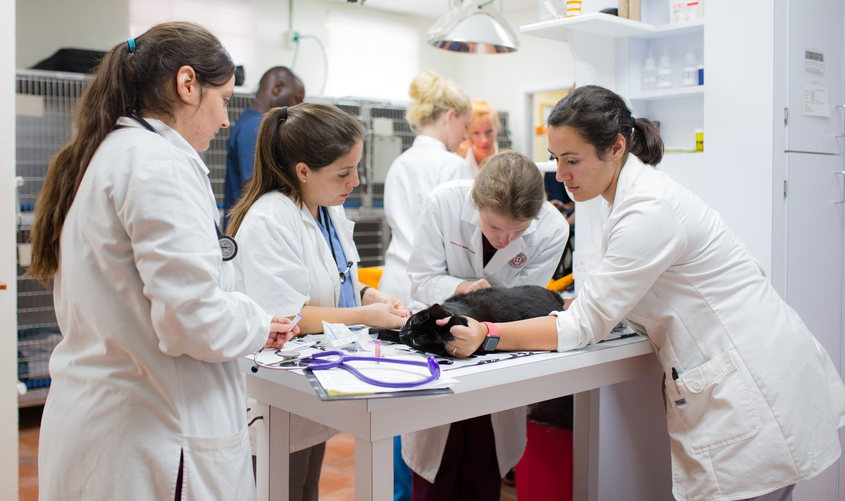
St. George’s University School of Veterinary Medicine students and graduates took the next step in their careers as aspiring veterinarians, matching into highly competitive postgraduate positions throughout the United States and Canada. Early 2020 reports confirm that DVM students secured 25 internships and 11 first-year residencies, with more results likely to come in throughout the spring.
This summer, SVM alums will begin postgraduate training in a variety of clinical specialty areas such as orthopedics, cardiology, ophthalmology, anesthesiology, immunology, diagnostic imaging, and pathology, matching into positions at veterinary hospitals such as the University of Florida, North Carolina State University, and the University of California, San Diego, as well as veterinary centers in Alberta and Saskatoon, in Canada.
“We congratulate our students who are on to the next chapter in their careers in veterinary medicine,” said Dr. Neil Olson, dean of SGU’s School of Veterinary Medicine. “Throughout their basic science and clinical years, they endured a rigorous course load and absorbed a wealth of information. We are pleased that the curriculum has adequately prepared them to meet the highest of practicing standards and are delighted that their efforts have been rewarded.”
After graduating, students may obtain an internship, a one-year clinical training program used to prepare a veterinarian for high-quality service in practice, or even a residency, which is a two- to three-year program. Students must receive a passing grade on the North American Veterinary Licensing Examination (NAVLE) in order to achieve certification by any of the veterinary medical specialty boards. The 360 multiple-choice-question test is required for licensure to practice veterinary medicine in both the US and Canada. St. George’s University’s veterinary medical students posted a 95 percent pass rate on the exam in 2017-2018 according to the International Council for Veterinary Assessment (ICVA).
“We couldn’t be prouder of our students. They’ve made it through a very strenuous program with great drive and determination,” praised Dr. Anne Corrigan, associate dean of academics in the SVM. “At St. George’s, we believe it’s important that our students have a strong foundation of knowledge, hands-on clinical skills, and confidence when they set off for their careers as veterinarians. As faculty, we believe that we have provided our students with the knowledge and skills to succeed in advanced training programs. We have the utmost respect for our students and are proud to call them our colleagues.”
Adding to its many accomplishments, St. George’s University’s School of Veterinary Medicine’s Doctor of Veterinary Medicine (DVM) program recently received full accreditation from the Royal College of Veterinary Surgeons (RCVS), the organization that sets the standards of veterinary care in the United Kingdom, through 2024. The School of Veterinary Medicine is now one of the few schools in the world accredited by both the American Veterinary Medical Association Council on Education (AVMA COE) in the US and Canada, as well as the RCVS in the UK.
SGU’s DVM graduates are now fully eligible to seek licensure in the US and Canada without further steps other than successfully passing the NAVLE. DVM graduates who have also completed the Global Veterinary Health Track will also be eligible to register as members of the RCVS and practice in the UK without further examination.
Now in its 21st year, the School of Veterinary Medicine has graduated nearly 1,700 students who have gone on to practice in 49 states in the United States and 16 other countries around the world. The School also maintains partnerships with 31 universities and clinical facilities in the US, UK, Canada, Ireland, and Australia, where fourth-year students spend a year of clinical training at an affiliated veterinary school.
–Ray-Donna Peters